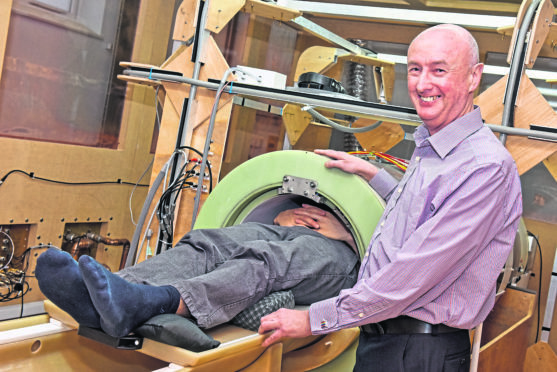The National Health Service celebrated its 70th birthday yesterday and has been at the forefront of pioneering medical innovation.
Aberdeen University has played its own significant role in changing the face of the NHS and continues to innovate in medical research and in training the doctors and health professionals for the future.
MRI (Magnetic Resonance Imaging) scans are now a routine part of medicine and hundreds are carried out every day in NHS hospitals – and those around the world – but this vital piece of equipment owes its origins to a team of visionary medical physicists led by the the university’s Professor John Mallard.
He and his colleagues developed and tested the MRI body scanning machine which they used to scan the very first patient in August 1980 and subsequently brought its widespread use to the medical profession.
The university continues to lead the world in this area and, in November last year, a team of Aberdeen scientists achieved another medical first when they scanned the first patients using a ground-breaking ‘Fast Field Cycling’ MRI scanner, likened to “100 MRIs in one”.
Professor David Lurie said the technology “greatly expands the diagnostic potential of the machines” and added that conducting the first scan marked “a major step towards our technology being adopted by hospitals to benefit patients, which is the ultimate goal of our research.”
A decade before the NHS came into existence, another medical pioneer, Dugald Baird was appointed Regius Professor of Midwifery at Aberdeen – a post he would hold for almost 30 years and use to transform the care of mothers and babies.
Baird was the first to show the huge effect of social factors on obstetric outcome and was a strong supporter of fertility control and reproductive rights for women.
Under his leadership, Aberdeen became a Mecca for obstetric practice and research, so much so that, for a time, the city had the best birth outcomes in the UK, and among the best in Europe.
His work underpinned the roll out of formal family planning services across the NHS in Scotland in 1974 and his name will continue to provide the benchmark when Aberdeen’s newest hospital – the Baird Family Hospital – opens in 2020.
It will offer maternity, gynaecology, breast screening and breast surgery, neonatal, and reproductive medicine services and will sit alongside a research centre which will allow university teams to continue their pioneering work.
